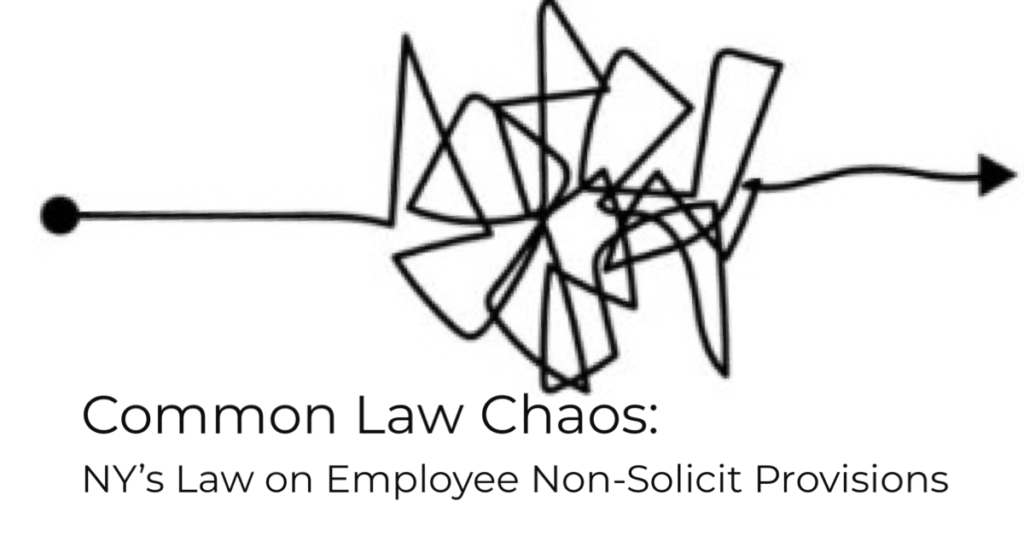Common Law Chaos: NY’s Unsettled Law on Employee Non-Solicitation Provisions

By Thomas E. Chase, Esq.
February 13, 2024
New York law regarding the enforcement of employee non-solicit provisions (AKA “non-recruitment” provisions) is a mess. It is an area of the common law that needs an authoritative appellate court decision to provide order where there is now chaos.
Disputes frequently arise when one company hires a group of employees from another. Such “lift-outs” spawn claims that the departing employees wrongfully solicited each other in violation of the non-recruitment provisions in their employment agreements. Despite the frequency of such disputes, New York law is unclear whether restrictions prohibiting employees from recruiting fellow employees are enforceable.
No Controlling Law
Initially, trial courts frequently note the lack of controlling appellate law on the topic. See Parella Weinberg v. Kramer, 78 Misc.3d 124, *7 (N.Y. Co. 2023)(“New York caselaw on provisions prohibiting the solicitation of employees is scant”); Admarketplace Inc. v. Salzman, 2014 WL 1278504, *4 (N.Y. Co. 2014)(“there is scant case law on the enforceability of non-recruitment clauses”); OTG Management, LLC v. Konstantinidis, 40 Misc.3d 617, 621 (N.Y. Co. 2013) (“Only one state court has discussed the standard” applicable to non-recruit provisions). Given the absence of controlling authority, there is significant disagreement among trial courts regarding the enforcement of non-recruitment provisions.
Non-Recruitment Provisions Held Unenforceable
The first reported NY case to directly address the issue held that non-recruitment provisions are enforceable only if they serve the ancillary purpose of protecting confidential information, trade secrets, or uniquely valuable employees. Lazer Inc. v. Kesselring, 13 Misc.3d 427, 433 (Mon. Co. 2005). More recent cases, particularly two decisions by Federal District Judge Jed Rakoff, also flunked non-recruitment provisions on the ground that employers have no legitimate interest in deterring solicitation of their employees. In In re Document Technologies Litigation, 275 F.Supp.3d 454,468 (S.D.N.Y. 2017)(Rakoff, J.), the Court held that the prevention of coordinated “en masse” resignations was not a legally cognizable interest that could be protected by non-recruitment restraints on trade. “The legitimate interest of the employer must protect against unfair competition, not simply avoid competition in a general sense.” Non-recruit provisions impermissibly “keep departing employees in the dark about job opportunities . . . the public interest most strongly supports the free flow of information concerning alternative employment.” Id. See also QBE America, Inc. v. Allen, 2022 WL 889838, *11 (S.D.N.Y. 2022) (Rakoff, J.)(refusing to enforce a non-recruitment provision, stating “there is nothing unfair about coordinated departures of workers marketing themselves as a package deal”). Other cases similarly refuse to enforce non-recruitment provisions as written, holding that they protect no legitimate interest of the employer. See National Tax and Financial Services, Inc. v. Ciocia, 2021 WL 860179 (N.Y. Co. 2022) (following In re Document Tech); Parmanens Capital, L.P. v. Bruce, 2022 WL 3442270, *9 (S.D.N.Y. 2022)(flunking non-recruitment provision); Reed Elsevier Inc. v. Transunion Holding Co., Inc., 2014 WL 97317, *9 (S.D.N.Y. 2014)(flunking non-recruit provision).
Non-Recruitment Provisions Held Enforceable
A similar number of New York cases hold that non-recruitment provisions are enforceable and show little concern about their anti-competitive effects. These cases reason that non-recruitment provisions pose fewer anti-competitive concerns than do non-compete provisions because an employee subject to a non-recruitment provision remains free to pursue his or her career. “Non-recruitment clauses are inherently more reasonable and less restrictive that non-compete clauses.” OTG Management, 40 Misc.3d at 621 (enforcing non-recruitment provision); Renaissance Nutrition, Inc. v. Jarrett, 2012 WL 42171 (W.D.N.Y. 2012) (enforcing non-recruitment provision, stating “a non-recruitment clause, as opposed to a non-compete clause, does not infringe on an employee’s ability to engage in an occupation, but merely infringes on his ability to recruit former co-workers”). See also Parella Weinberg, 78 Misc.3d 124, *8 (enforcing non-recruitment provision); Admarketplace, 2014 WL 1278504, *4 (same); Oliver Wyman, Inc. v. Eielson, 282 F.Supp.3d 684 (S.D.N.Y. 2017)(same).
Conclusion
In conclusion, there is little uniformity in the enforcement of non-recruitment provisions under New York law. The cases addressing the issue reach wildly different results and provide little compelling rationale for their conclusions. No appellate court has issued an authoritative decision guiding the lower courts. The state and federal trial courts, therefore, feel free to chart their own course regardless of the resulting inconsistency and unpredictability. Both employers and employees deserve better guidance on this important and commonly occurring issue. Hopefully, an appellate court will soon fill the vacuum with a decision defining the rules of the road regarding employee non-recruitment provisions.